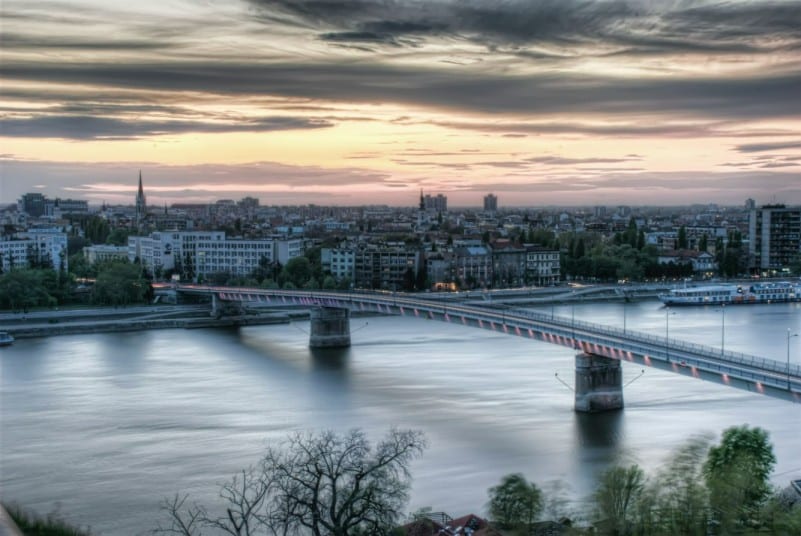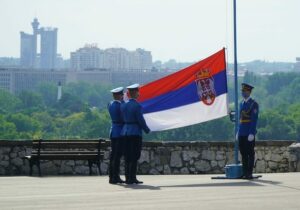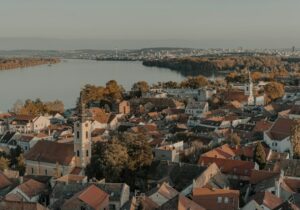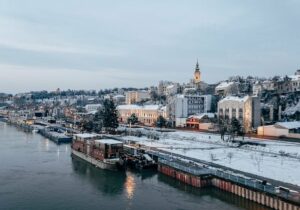
The growing appeal of Serbia to foreign nationals has made it a rising star among popular second-residence countries. This surge in popularity is attributed to Serbia’s progressive immigration laws and enticing incentives aimed at attracting foreign investments and expertise. These characteristics make Serbia a compelling choice for companies and individuals, presenting a host of advantages of relocating to the Balkan country.
This article will break down the residence permits available in Serbia, from temporary to permanent residence permits. We’ll explore the advantages of gaining Serbian residency in detail and list the eligibility criteria and steps for obtaining a temporary residence permit through a business or real estate investment.
Types of Serbian Residence Permits
When applying for a Serbian residence permit, the general rule is to obtain an entry visa first. However, this requirement is waived if you are a foreigner with a passport from a country like the United States, Canada, or Australia with visa free entry into Serbia or possess a US, UK, or Schengen Visa. If you don’t hold a passport with visa free entry or an eligible tourist visa, you must obtain a short-term visa (visa C) granting access and stay for up to 90 days in 180 days.
There are three types of residence permits in Serbia:
- Long-term visa (visa D)
- Temporary residence
- Permanent residence in Serbia
Long-term visa (visa D)
Serbia’s long-term visa – shortened to visa D – is the authorization for entry and stays lasting up to 90 days in the Republic of Serbia out of 180 days. For those seeking temporary residence and needing a visa to enter the Republic of Serbia, securing a visa D before arriving in the country is essential.
It’s crucial to highlight that the grounds for applying for a visa D must align with those for applying for a temporary residence permit. For instance, if you receive a visa D through an employment contract with a Serbian employer, applying for a temporary residence permit based on family reunification is not an option.
Serbia temporary residence permit
If your period of stay in Serbia will exceed 180 days, you will need to apply for a temporary Serbia residence permit. The validity for a temporary residence permit in Serbia is one to three years, depending on individual cases and the visa used to obtain it.
Common practice is that competent authorities in Serbia grant first-time applicants a temporary permit for six months. The following grounds justify a foreign citizen’s request for a temporary residence permit in Serbia.
- Work contract
- Business and technical activities
- Professional engagements, such as participation in sporting activities
- Enrollment in an educational institution
- Family reunification with the citizen of Serbia
- Activities related to a church or religious community
- Medical treatment
- Purchase of real estate
Should a foreign citizen fulfill one of the following cases or any other conditions accepted under Serbian immigration law, they will be issued a passport stamp to confirm temporary residence approval and residence registration.
Foreign nationals granted temporary residence must ensure the utilization of their residency aligns with its intended purpose. Permit holders who wish to extend their temporary residency permit can submit a request for extension up to the date their permit expires and no more than three months prior to expiration.
The justification for extending the residence permit must align with the legal grounds on which the permit was originally granted. Additionally, permit holders must maintain residency in Serbia for at least 183 days each year for an extension to be approved.
Serbia permanent residence permit
If your goal is to establish Serbia as your permanent residence, obtaining a permanent residency permit is the natural progression after temporary residency. A permanent residence visa in Serbia may be awarded to foreign nationals by a relevant authority if any of the following conditions are met:
- They have lived in the Republic of Serbia continuously for at least three years, with no more than 183 days outside the country each year.
- They are a minor with temporary residence, with at least one Serbian parent or foreign parent possessing permanent residence status in the Republic of Serbia.
- They have a temporary residence permit and are identified as contributors to the interests of the Republic of Serbia or are granted permission to stay in the Republic for humanitarian reasons.
In addition to meeting the formal conditions, there is a requirement to thoroughly justify and substantiate the reasons for seeking a permanent residence permit. The Serbian Ministry of Interior exercises its discretionary authority on approving requests for permanent residency, considering not only formal criteria but also practical and tangible factors associated with the request.
For example, the time foreigners have spent in Serbia in the past three years, whether they are tax residents and pay income taxes to the Republic or have actively contributed to the local community and society through employment or other meaningful engagements.
How to Obtain a Serbian Residence Permit in 2024
Obtaining a Serbia Residence Permit by Investment
The Serbian investment program is a legitimate option to obtain a Serbia residence permit. The Serbian immigrant investor program was launched with the aim of attracting foreign investors, presenting two investment options as a pathway to qualify for temporary residence in Serbia.

- Real estate acquisition: Purchase real estate anywhere in Serbia.
- Business investment: Serbian company formation or investing in an existing Serbian company.
A highly attraction feature of Serbia’s investment visa among residency by investment programs is there is no minimum investment amount to qualify for a residence permit in Serbia. After making the required investment, a foreign national can gain a residence permit in Serbia within 30 days.
This contrasts with many EU residency permits, where a qualifying real estate investment would require a property purchase of €250,000 or more.
Real estate acquisition
Buying real estate has become an increasingly popular choice to gain residency in European countries among foreign nationals. Serbian authorities have introduced their own system, granting residency for real estate ownership.
Residency is only granted upon the completed real estate purchase, so carrying out the necessary checks is essential before finalizing a purchase. These include verifying the real estate title deed, ensuring compliance with local zoning regulations, and confirming the absence of legal encumbrances.
Application process for real estate investment
- Engage a competent authority to assess the property’s condition and ownership status, confirming that it aligns with your intended use and meets all safety standards.
- Ensure you understand the tax implications of acquiring real estate in Serbia. This involves researching property taxes, transaction costs, and applicable capital gains taxes to avoid an unnecessary tax burden and make well-informed financial decisions.
- Certification of the purchase contract for immovable property is a legal requirement in Serbia and must be conducted in the presence of a notary public.
- Following certification, you must submit a request with the necessary documentation to the Real Estate Cadaster. The Cadaster is responsible for registering the ownership right for that specific property on your behalf.
- Applying for residency through real estate acquisition requires submitting a certified purchase contract to the Police Department or eUprava online portal, as the decision does not lie with the Real Estate Cadaster.
An essential point regarding real estate acquisitions in Serbia is that a foreign national is not legally allowed to own land in Serbia; their scope is confined to acquiring properties situated on the land.
Nonetheless, an advantage of residency permits by real estate investment in Serbia compared to equivalent EU residence permit options is there is no qualifying amount to be eligible for the program. Investors can purchase property in Serbia of any value and gain a Serbia residence permit.
Business investment
Company formation is the second and last investment option for Serbia’s investment visa program. Foreigners notably favor it, thanks to the country’s accessible entry requirements. Establishing a Serbian legal entity serves as the legal foundation for applying for a temporary residency in Serbia.
The most common company formation is a limited liability company (LLC)-known as a DOO (društvo sa ograničenom odgovornošću) in Serbia. In addition to registering a legal entity, investors must:
- Open a corporate bank account
- Keep the company active through the permit’s validity
This business can be in any industry, from scientific research to construction. Additionally, a foreign national is allowed to form the company with themself as the only employee.
Application process for business investment
- Select your business name and verify its availability with the Serbian Business Registers Agency (SBRA).
- Open a corporate bank account at any national bank in Serbia.
- Apply for the necessary licenses and permits. Depending on the industry, you may require a permit to conduct business. For example, if your business is in the construction industry, you will need a construction permit from the Serbian Ministry of Construction, Transport, and Infrastructure.
- Ensure the company’s tax registration and tax returns are submitted to the Serbian tax authority.
- Obtain confirmation of company incorporation from the SBRA and submit a notary public for certification.
- Gather the certified certificate of incorporation and any other required documents and submit them to a Police station in Serbia or the eUprava online portal to apply for the residence permit.
Similar to investing in real estate, a significant benefit of establishing a business is no minimum investment. A foreign national need only incorporate a business to qualify for the permit. Furthermore, the business does not need to be actively trading or have employees besides the applicant.
Obtaining a Serbia Residence Permit through Employment
A work permit is another route to Serbian residency, allowing individuals who obtain a work contract with a Serbian company to legally stay and work there. To pursue this avenue, individuals must secure a job offer from a Serbian employer, and the employer will play a crucial role in applying for a work permit.

- Prior to employing a foreign worker, the employer must request the Serbian National Employment Service (NES) to perform a labor market assessment, verifying the absence of qualified Serbian nationals for the given position.
- The NES will carry out the assessment and provide the employer with a report within one month.
- Should the NES identify a qualified candidate for the role, the employer is advised to assess the candidate’s qualifications. While the employer is not compelled to hire recommended candidates, opting for a foreign applicant requires an explanation to be provided to the NES.
- When the need for a foreign worker is established, the employer can seek a work permit through the local organization for employment affairs.
The processing time for a work permit is around one to two weeks. Once the work permit is granted, similar to other pathways, an application can be submitted for a residence permit through the Serbian Ministry of Interior Affairs. The validity period will be one to three years, depending on the length of the employment contract.
Obtaining a Serbia Residence Permit through Marriage
Another legal basis for applying for a residence permit in Serbia under Serbian immigration law is family reunion through marriage to a Serbian citizen or a foreigner with a valid Serbian residence permit. For residency purposes, a Serbian marriage certificate or a foreign certificate legalized by a competent Serbian authority must have been issued within six months.
Eligible family members for a family reunion also include the foreign applicant and spouses’ children, provided they are both present on the birth certificate.
Marriage of convenience
A recent amendment to the Serbian Law on Foreigners includes the new legislation on ‘marriage of convenience,’ designed to deter the applications from individuals in deceptive marriages. The competent authority will perform a comprehensive evaluation to determine whether each case represents a marriage of convenience. Any applications for family members through a marriage deemed a marriage of convenience will be denied.
Serbia Residence Permit: Required Documents
As part of the legal requirements to gain Serbian residency, applicants are required to present the following documents:
- Completed Serbian visa application form
- Valid passport with at least three months of validity
- Passport-size photographs
- Proof of paying visa fees
- Valid health insurance covering the duration of stay in Serbia
- Proof of sufficient funds to sustain themselves and family members included in the application.
- Certified marriage certificate (if applicable)
- Certified birth certificate (if applicable)
- All the necessary documents as per your grounds for applying
Health Insurance
Before granting temporary residence visas, Serbian authorities require applicants to present proof of private health insurance or health insurance from their home country that covers Serbia based on a bilateral agreement.
Apply for a residence permit online
Previously, applications for temporary stay in Serbia had to be submitted in person at a local police station in Serbia. However, since April 2021, applicants can now apply for a residence permit through the eUprava portal.
While applications can be submitted online, a requirement to attend an in-person interview may be requested by a relevant Serbian authority. Upon an approved temporary residence permit, applicants must present at a police department to receive a stamp in their passport.

New Rules for Serbian Residence Permits
The Serbian government has introduced new rules that benefit both Serbia residence permit holders and foreigners considering Serbian residency. As of 4 August 2023, the following amendments took effect:
- The validity period for Serbia temporary residence permits has been increased from up to one year to up to three years.
- Temporary residence permit holders can request an extension to their permit up to the expiration date instead of a minimum of 30 days prior.
- Temporary residence permit holders can apply for permanent residency after three years instead of five.
- Investors, digital nomads, and highly qualified professionals can now qualify for a residence permit in Serbia.
Several additional changes are set to be introduced on 1 February 2024, namely a unified permit (single permit), which will combine work permits into a single Serbia residence permit. Additionally, the application process will be digitized, new biometric permits and national ID cards will be issued, and the unified permit will include the right to work in Serbia.
Serbia Residence Permit Processing Time
Residence permit applications are initially assessed by the Serbian Police Department and submitted to the Ministry of Internal Affairs to conduct further due diligence checks and issue permits. This process generally takes up to 30 days.
After submitting your residency application, your physical days in the Republic of Serbia on a tourist visa are no longer counted. This means you have legal stay in Serbia until the outcome of your residence permit application has been concluded.
Serbia Residence Permit Application Fees
Specific fees for a Serbia residence permit application can vary based on factors such as the type of residence permit you are applying for, your nationality, and other individual circumstances. You can expect to pay between RSD 5,000 to 7,000 ($45 to $70) for temporary residence permit applications. You should also consider the fees required for your specific route, including:
- Company registration and certificates
- Property surveyance
- Legal document certification by a notary public
- Sworn translations
Obtaining a Permanent Visa in Serbia
Obtaining a Permanent Visa in Serbia is possible if you have lived in the country legally for three years. After meeting this residency requirement, you can apply for a permanent residence permit, which offers long-term stay benefits. The application process typically involves submitting relevant documentation, including:
- A valid temporary residence permit
- Proof of continuous legal residence
- Proof of financial stability, which can include being a tax resident and providing evidence of paying taxes
- Proof of property ownership or a lease
- A medical certificate issued by a relevant Serbian authority
 Obtaining Serbian Citizenship
Obtaining Serbian Citizenship
A temporary residence permit in Serbia can be traded for a permanent residence permit after three years of residency. This was previously five years; however, changes to Serbian immigration law, which came into effect on 4 August 2023, have reduced the required residence permit from five years to three.
Temporary residence permit holders are required to maintain at least 183 physical presence in the country each year to qualify for permanent residency.
The new amendments to Serbian Law on Foreigners include a reduced eight-year residency requirement for obtaining citizenship by naturalization to six years. The primary requirement for naturalization includes maintaining a permanent residence for three years.
Like temporary residency, prospective Serbian citizens must physically present in the country for at least 183 days each year prior to applying for citizenship and a Serbian passport. However, they are not required to prove knowledge of the Serbian language or the history of the Serbia to become a Serbian citizen.
Benefits of a Serbian Residence Permit
While Serbia hasn’t traditionally been a top choice for foreigners looking to relocate, it has emerged as a sought-after second residence for several reasons.
Accessible investment options for residency
Contributing to Serbia’s economic development is an option to qualify for Serbian residency, and a noteworthy advantage is that no minimum investment is required to obtain a residence permit. This means a foreign national can establish a business or purchase a property of any value to get a Serbia temporary residence permit. Additionally, a Serbian legal entity doesn’t need to be actively trading or provide local jobs.
Low taxes
Many foreigners seek low-tax jurisdictions for second residency, and Serbia is one of the lowest-tax countries in Europe. Depending on their income, Serbian residents are subject to a flat tax rate of 10, 15, or 20 percent. Corporate income tax is charged at a flat rate of 15 percent.
Low cost of living
Serbia has one of the lowest costs of living in Europe. The average monthly rent for a one-bedroom apartment is $410 in Serbia compared to $1,680 in the United States. Additionally, the cost of groceries, eating, and public transportation is much lower than in most Western countries.
Investment opportunities
The Serbian government has established two free trade agreements, the Serbian Interim Agreement on Trade and Trade-Related Issues and the Stabilization and Association Agreement with the European Union. These have paved the way for ease of trade with the EU via provisions including tariff-free imports from EU countries.
Increased global mobility
As part of an agreement between Western Balkan nations, Serbian temporary residence card holders enjoy easy entry into five regional countries. Serbia TRC visa free countries include Bosnia and Herzegovina, Montenegro, and North Macedonia. Serbian residents can use their national identity card for entry.
How Can Global Citizen Solutions Help You?
Global Citizen Solutions is a boutique migration consultancy firm with years of experience delivering bespoke residence and citizenship by investment solutions for international families. With offices worldwide and an experienced, hands-on team, we have helped hundreds of clients worldwide acquire citizenship, residence visas, or homes while diversifying their portfolios with robust investments.
We guide you from start to finish, taking you beyond your citizenship or residency by investment application.

Frequently Asked Questions about Serbian Residence Permits
How do you become a resident of Serbia?
You can become a resident of the Republic of Serbia through one of the following methods:
- An employment contract with a Serbian company
- Establishing a Serbian company
- Purchasing a property in Serbia
- Enrolling in a Serbian educational institution
- Marriage to a Serbian citizen or foreign resident with legal stay in Serbia
Those involved in activities related to a church or religious community or receiving medical treatments can also qualify for Serbian residency. Serbia residence permit requirements include obtaining health insurance and having enough resources to sustain yourself in Serbia.
Can US citizens live in Serbia?
US citizens can live in Serbia, provided they fulfill the criteria to obtain a Serbian residence permit. The criteria include activities such as purchasing property in Serbia, forming a Serbian legal entity, or obtaining a work contract with a Serbian company.
Can I get residency in Serbia if I buy a house?
Investing in real estate is an option to obtain a residence permit in Serbia. Foreign nationals can purchase property of any value to qualify for residency in Serbia.
How long can a US citizen stay in Serbia?
Based on the visa requirements for US passport holders, a US citizen can visit Serbia for 90 days within 180 days.
Can I extend my Serbian tourist visa?
Foreigners are generally required to leave the Republic of Serbia once the stay allowed in their tourist visa expires. However, the Serbian Law on Foreigners does provide provisions, allowing extensions in exceptional circumstances, which is subject to approval by the Ministry of Internal Affairs.
Am I eligible for temporary residence in Serbia through my retirement income?
Retirement income or other forms of passive income do not fulfill the legal requirements to qualify for temporary residence in Serbia. However, accessible options to acquire a Serbian temporary residence permit are company formation and real estate investment. As a retiree, you can form a Serbian company or purchase real estate to qualify for temporary residence.
Can I visit Serbia with a US residence permit?
Foreigners who hold a valid US residence permit or tourist visa are eligible to travel to Serbia without obtaining a visa C (short-stay visa) and can stay for 90 days within 180 days.
Can Indians get permanent residency in Serbia?
There is no specific program granting Serbia permanent residence for Indian citizens; however, Indians can obtain a temporary residence permit and qualify for permanent residency after three years, provided they meet the minimum stay requirement.
The criteria to obtain a Serbia residence permit for Indian nationals is the same for all other foreign citizens, which includes fulfilling activities such as purchasing property or establishing a business in Serbia. After obtaining a permanent residence permit and six years of residency, Indians can apply for Serbian citizenship and a Serbian passport.
Is Serbia included in the Schengen Visa?
Serbia is a potential candidate to join the EU. It is not yet a member of the EU or Schengen Area. Nonetheless, Serbia’s immigration policy allows holders of a valid Schengen Visa to enter Serbia and stay for up to 90 days within 180 days.

 Obtaining Serbian Citizenship
Obtaining Serbian Citizenship
